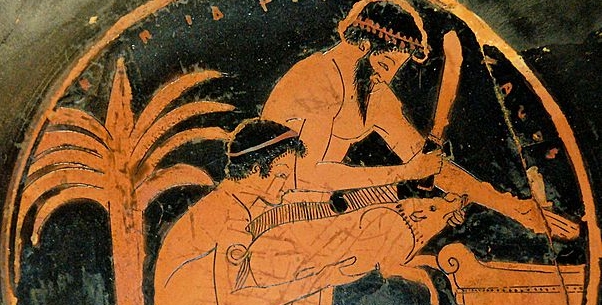
May 12, 2014, by Helen Lovatt
(Ancient) Advice Column 2: Exam Season
Esther Eidinow is back, this time with strategies to help with exams.
The response to the first Ancient Advice Column has been overwhelming: we’re pleased to say that the wisdom of the ancients appears still to be highly valued.
I’m afraid it hasn’t been possible to write back to everyone individually, so I (and I hope my colleagues, where appropriate) will be publishing some of the more generalisable questions, and answers to them, in this column over the coming months, suitably anonymised, of course. But today’s column comes to you as a matter of urgency: exam season is upon us, and our mailbox is bursting with anxious inquiries about preparation.
Now, I’m sure that all those with exams who are reading this column are taking time out from a carefully planned schedule, which ensures that they are eating and sleeping properly, getting the hours in, but also keeping themselves refreshed and focused.
But how to get that extra edge? How to ensure that the gods are on your side?
The answer is, of course, to sacrifice to the gods.
Now, the types of sacrifices available vary—so my advice is, think practically. With the likely time pressures, you probably don’t want to go for something very elaborate, such as a hecatomb (100 or so cattle; a pricey option).
And keep your landlord, housemates and neighbours in mind. Ask yourself: Can you get the animal home? Will anyone notice if you cut an animal’s throat in the kitchen? (On the plus side—think of the feasting afterwards. This is a great opportunity to make sure everyone is getting enough protein before the big day.)
But if dealing with livestock makes you nervous, remember a liquid sacrifice—or libation—or a sacrificial cake, can make a very acceptable alternative. The important thing is that you offer the gods something, thus ensuring that they owe you charis or favour, and may repay it with a good exam result.
Turning to the details of the sacrifice itself, you’ll also want to select your divinity carefully from among the multitude available. As we learn from Xenophon , in his Anabasis, sacrificing to the wrong god, however persistently, will simply leave you unsuccessful and frustrated. And, of course, ignoring the right god can have famously dire consequences.
One way to manage this problem is to consult an oracle sanctuary—where you can pose a question to a god in the hope of getting expert guidance. Once there, follow the example of the numerous ancient consultants who left behind their questions, inscribed on lead tablets, at the oracle of Dodona. Samples include: ‘To which god should he pray and sacrifice so that his fortunes might improve?’ or ‘About all my property, my children and my wife’s, by praying to which god would he fare well?’ or ‘He asks … by praying and sacrificing to Zeus and Dione and to which of the gods or daimons or heroes might he be healthy?’ (Get the idea?)
If getting to an oracle isn’t possible, then think again of Xenophon: when he realised his sacrifices weren’t having the desired effects, he asked a travelling seer whether he was sacrificing to the right god. He wasn’t—but the seer soon set him right, and things improved.
I’m aware that there will be those among you, who feel that involving the gods like this is simply too risky (please see Advice Column 1 for some insights into divine attitudes). There are alternatives: you may be tempted to try an amulet and/or perhaps a spell. We will be offering some advice on these fronts in future columns, so do visit us again.
And so, we offer this final thought: the Ancient Advice column takes no responsibility for the outcome of its advice; remember exam results may go down as well as up. Watch this space for further tips on avoiding ancient (mis)fortune. And if you have any questions of your own do write in, and we’ll do our best to help you: esther.eidinow@nottingham.ac.uk
[The following advice on coping with the day of an exam is mostly sensible, except that we usually don’t get to choose our seat. http://www.goodluckexams.com/what-to-do-on-the-day-of-an-exam/ ]
Image: Do Try This at Home? Tondo from an Attic red-figure cup, showing the Sacrifice of a young boar, with kalos inscription (ΕΠΙΔΡΟΜΟΣ ΚΑΛΟΣ); Epidromos Painter; c. 510 BC–500 BC (Wikimedia Commons)

Speaking as chief god, I’d like to make it clear that neither Trinny the History Cat nor wildlife from the lake is acceptable as a sacrifice.* Libations are probably a better option. Good luck in the exams, and may I smile on your endeavours.
Love,
Zeus
*Especially not swans. I like swans.
[…] and looking at m’learned colleague Esther Eidinow’s ancient solutions to modern problems on this blog, I somehow came up with this: an appeal for a modern solution to an ancient problem. Esther and I […]